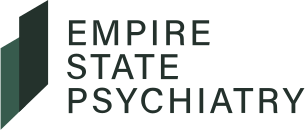What is PTSD?
Post-Traumatic Stress Disorder (PTSD) is a mental health condition that arises in some individuals after they experience or witness a traumatic event. These events can range from natural disasters and accidents to acts of violence, war, or personal assaults. While many people may initially experience stress or anxiety following such events, those with PTSD continue to feel the effects long after the event has passed, often with increasing intensity.
PTSD is characterized by a complex array of symptoms that persist for more than a month and significantly impact an individual’s daily life. It can affect anyone, regardless of age, gender, or background. At Empire State Psychiatry in New York City, our team of experienced psychiatrists is dedicated to diagnosing and providing comprehensive care for those suffering from PTSD.
What Are The Causes of PTSD?
PTSD develops as a result of exposure to a traumatic event, but not everyone who experiences trauma will develop the disorder. Certain risk factors may increase the likelihood of developing PTSD, including:
- Previous Trauma: Individuals with a history of trauma, particularly during childhood, are more susceptible to developing PTSD after a subsequent traumatic event.
- Mental Health History: A history of anxiety, depression, or other mental health disorders can increase the risk.
- Severity and Duration of the Trauma: The more severe or prolonged the traumatic event, the higher the likelihood of developing PTSD.
- Lack of Support: Individuals who lack a strong support system or feel isolated may be more vulnerable to PTSD.
PTSD can have a profound impact on all aspects of an individual’s life, including their relationships, work, and overall well-being. The symptoms can be debilitating, leading to a decrease in quality of life and an increased risk of developing other mental health disorders, such as depression or substance abuse.
What Are The Signs And Symptoms of PTSD?
PTSD symptoms can be broadly categorized into four main types:
- Intrusive Thoughts: This includes flashbacks, nightmares, or unwanted distressing memories of the traumatic event. These symptoms can make individuals feel as though they are reliving the experience, often causing significant emotional distress.
- Avoidance: Individuals with PTSD may go to great lengths to avoid places, people, or activities that remind them of the traumatic event. This avoidance can lead to significant changes in behavior, such as withdrawing from social interactions or refusing to discuss the event.
- Negative Changes in Thinking and Mood: PTSD often leads to feelings of hopelessness, detachment from others, and a pervasive sense of fear or guilt. Many individuals struggle with distorted beliefs about themselves or others, such as self-blame or a mistrust of others.
- Changes in Physical and Emotional Reactions: This includes being easily startled, feeling tense or “on edge,” experiencing difficulty sleeping, or having angry outbursts. These symptoms, also known as hyperarousal, can make it difficult for individuals to relax or feel safe.
What Are Possible Treatments For PTSD?
MEDICATION FOR PTSD
At Empire State Psychiatry, located in the heart of New York City, our team of experienced psychiatrists is dedicated to helping patients manage and overcome Post-Traumatic Stress Disorder (PTSD). While therapy is often a cornerstone in the treatment of PTSD, medication can play a crucial role in alleviating symptoms, allowing individuals to engage more effectively in their therapeutic processes and daily lives.
Understanding PTSD
PTSD is a mental health condition that can develop after experiencing or witnessing a traumatic event. Symptoms of PTSD can include flashbacks, nightmares, severe anxiety, and uncontrollable thoughts about the event. These symptoms can be debilitating, affecting a person’s ability to function in everyday life. At Empire State Psychiatry, we understand the profound impact PTSD can have and are committed to providing comprehensive care tailored to each individual’s needs.
Role of medication in PTSD treatment
Medication is often prescribed as part of a comprehensive treatment plan for PTSD, particularly when symptoms are severe or when therapy alone does not provide sufficient relief. The goal of medication is to reduce the intensity of symptoms, such as anxiety, depression, and hyperarousal, enabling patients to participate more fully in therapy and other aspects of their lives.
Common PTSD medications
- Selective Serotonin Reuptake Inhibitors (SSRIs): SSRIs are the most commonly prescribed class of medication for PTSD. These include medications such as sertraline (Zoloft) and paroxetine (Paxil), both of which are approved by the FDA for the treatment of PTSD. SSRIs work by increasing the levels of serotonin in the brain, a neurotransmitter that helps regulate mood, anxiety, and stress.
- Serotonin-Norepinephrine Reuptake Inhibitors (SNRIs): SNRIs, such as venlafaxine (Effexor), are another class of antidepressants that may be prescribed for PTSD. These medications work by increasing the levels of both serotonin and norepinephrine, another neurotransmitter involved in mood regulation.
- Prazosin: Prazosin is an alpha-1 blocker that is often prescribed to address one of the most distressing symptoms of PTSD—nightmares. While originally developed to treat high blood pressure, prazosin has been found to be effective in reducing the frequency and intensity of nightmares associated with PTSD.
- Other Medications: In some cases, other types of medications, such as atypical antipsychotics or benzodiazepines, may be prescribed to help manage specific symptoms of PTSD. Atypical antipsychotics, like risperidone (Risperdal), may be used when there is a need to control severe anxiety or intrusive thoughts. However, these are generally considered only when other treatments have not been effective. Benzodiazepines are typically prescribed with caution and for short-term use due to the potential for dependence.
Personalized medication management
At Empire State Psychiatry, our approach to prescribing medication for PTSD is highly personalized. We recognize that each patient’s experience of PTSD is unique, and as such, we carefully consider factors such as the patient’s specific symptoms, overall health, and any other medications they may be taking. Our psychiatrists work closely with patients to monitor the effectiveness of the prescribed medication, making adjustments as needed to achieve the best possible outcomes.
Combining Medication with Therapy
Medication is most effective when combined with psychotherapy, such as Cognitive Behavioral Therapy (CBT) or Eye Movement Desensitization and Reprocessing (EMDR). At Empire State Psychiatry, we offer a comprehensive treatment plan that integrates medication management with evidence-based therapies, providing a holistic approach to treating PTSD.
THERAPY FOR PTSD
Cognitive Behavioral Therapy (CBT)
Cognitive Behavioral Therapy (CBT) is one of the most widely used and effective therapeutic approaches for treating PTSD. CBT helps patients identify and change negative thought patterns and behaviors that contribute to their distress. A specialized form of CBT, known as Trauma-Focused CBT (TF-CBT), is particularly beneficial for PTSD patients. TF-CBT focuses on helping individuals process and reframe the traumatic experience, reducing the impact of trauma-related thoughts and memories on daily functioning.
At Empire State Psychiatry, our therapists guide patients through structured CBT sessions, where they learn to challenge distorted thinking patterns, manage anxiety, and develop healthier coping mechanisms. Over time, CBT can lead to a significant reduction in PTSD symptoms, enabling individuals to lead more fulfilling lives.
Eye Movement Desensitization and Reprocessing (EMDR)
EMDR is a unique and highly effective therapy specifically designed to address trauma-related conditions like PTSD. This therapeutic approach involves the patient focusing on traumatic memories while simultaneously undergoing bilateral stimulation, such as guided eye movements. The goal of EMDR is to help the brain reprocess traumatic memories so that they are no longer as emotionally charged or distressing.
Our team at Empire State Psychiatry is trained in EMDR and utilizes this technique to help patients process their traumatic experiences in a safe and controlled environment. Many patients report significant improvements in their symptoms after completing a series of EMDR sessions, finding relief from the persistent distress caused by their traumatic memories.
Prolonged Exposure Therapy (RE)
Prolonged Exposure Therapy (PE) is another evidence-based treatment for PTSD that involves gradually and systematically exposing patients to trauma-related thoughts, feelings, and situations that they have been avoiding. The goal of PE is to reduce the fear and avoidance behaviors that are common in PTSD by helping patients confront and process their traumatic experiences in a controlled therapeutic setting.
At Empire State Psychiatry, our therapists work closely with patients to ensure that the exposure process is conducted safely and effectively. By gradually confronting their fears, patients can learn to manage their anxiety and diminish the power of trauma-related triggers, leading to a reduction in PTSD symptoms.
Schedule a psychiatric consultation.
If you are suffering from post-traumatic stress disorder (PTSD) due to past trauma or abuse, schedule a consultation with the trauma-informed providers at Empire State Psychiatry. Widely regarded as one of the top PTSD treatment centers in New York City, Empire State Psychiatry is committed to delivering expert, patient-centered psychiatric care. Their office is located in Midtown Manhattan, and they serve patients from the Upper East Side and surrounding New York City neighborhoods.

